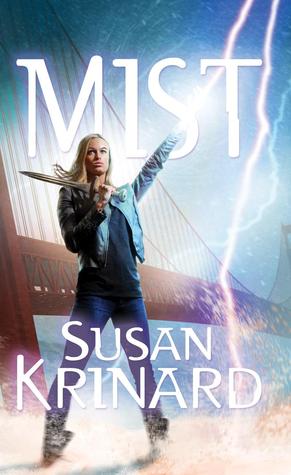I am very happy to welcome Susan Krinard here on the blog to chat about the mythology that is so intricately part of Mist, the first novel in her new series. Please welcome her warmly and make sure you stay with us ‘til the end for a giveaway!
---------------------
What would happen if an ageless Valkyrie, finally adjusting to life on earth as a “mortal,” suddenly discovered Ragnarok---the Last Battle that was supposed to destroy all the words, divine and human--never happened?
Okay, you ask, what is a Valkyrie, and what the heck is Ragnarok?
I used to love reading about mythology as a child, before I discovered the lure of science fiction and fantasy during 5th grade, when our teacher read A Wrinkle in Time by Madeleine L’Engle. I wanted to escape the real world, and mythology was a great way to do it.
One of my favorite books was D’Aulaire’s books of Norse and Greek mythology. They explained the stories in simple terms, and as my life went on I continue to be very interested in the tales of gods and heroes of many countries.
I was also a fan of the Thor comic books, which attracted me because of its “romantic” (in the old-fashioned sense), otherworldly setting and larger-than-life hero. So that was in the back of my mind when I wrote the short story “Mist” for the anthology Chicks Kick Ass two years ago. (All before the Thor movie came out, so any similarities between the movie Loki and mine are purely coincidental!)
So, back to the original question … what is a Valkyrie? In Norse mythology, the Valkyrie were semi-divine women who rode over battlefields, choosing who would live or die and selecting the bravest fallen warriors (Einherjar) to reside forever with Odin, ruler of the gods (Aesir), in his hall Valhalla. They fought and drank and prepared for the final battle (Ragnarok) between the Aesir and their enemies--the frost giants, Loki, and his monstrous children—which ancient prophecy foretold.
Valkyrie weren’t fighters; on their “days off” they wandered around Valhalla serving ale to the Einherjar and gods. To me, it seemed quite a come-down from riding wildly over battlefields.
So Mist, my Valkyrie heroine—never content with a more passive role—was discontented in Asgard until she and eleven of her Sisters were sent to Midgard (earth) with the gods’ twelve great Treasures. They were to guard them until the gods reclaimed them again … which, to Mist, seemed unlikely since nearly all the gods were to be destroyed at Ragnarok, along with the nine “Homeworlds,”-- dwarves, elves, giants, and all.
But things didn’t turne out as she thought they would. It seems the Aesir, along with allies and enemies, have lived on in the Great Void, Ginnungagap, where all magic and life originated. When she meets a frost giant in San Francisco’s Golden Gate Park, she realizes that nothing is what it seemed, and a new Ragnarok may be about to take place—on Midgard, the last surviving Homeworld.
All this brings us back to the mythological underpinnings of Mist. The second major protagonist is the elf Dainn, whose Homeworld, Alfheim, was also destroyed. He is the messenger of the goddess Freya, sent to gather the Treasures and prepare the Valkyrie for war.
But not much is said about elves in Norse mythology, at least not in the writings that still remain to us (stories told after Christianity came to the Scandinavian countries.) We only have a few brief descriptions of beautiful beings who feasted with Odin in Valhalla. That immediately brings to mind Tolkien’s elves—he used Norse mythology in his work—and since I like tall, beautiful, stately fictional beings, that’s what I chose to do with my “Alfar.” As Mist discovers, Dainn, who is quite the looker himself, is not only an intellectual elf with an affinity for nature. He also has a dangerous darker side that could threaten her, the tasks she must perform for the Aesir, and even her adopted world.
There were several kinds of giants in Norse mythology. Not all were huge, hulking, ugly creatures bent on destruction. Some were herders and farmers, and a few even intermarried with the gods. They resided in Jotunheim. But there was another Homeworld for the much more hostile frost giants, and another for fire giants, both of whom would stand against the gods at Ragnarok.
In Mist, I chose to focus on the frost giants and decided to use Jotunheim as their Homeworld as a way of simplifying the mythology. My giants come in several shapes and sizes, and many can also look human, which makes it easier for them to infiltrate mortal society in service to Loki’s malignant ends.
And speaking of Loki …he was the perennial Trickster, not unlike those in many mythologies. He was the one who kept the Aesir on their toes, who could never be completely trusted, who sometimes worked with the Aesir and other times betrayed them. He was supposed to be handsome and charming when he wished, vicious and spiteful at others. No one knew quite what to do with him.
I chose to make my Loki the central villain, who comes to earth to defeat the Aesir and “rule” Midgard. (I say “rule” because, unlike the Loki in cinema, he’s more interested in introducing total chaos on earth and picking up the pieces of what’s left.) Loki is indeed handsome and charming, careless of collateral damage or mortal life, but also subject to one major vulnerability that makes him very “human.” He’s a villain it’s hard not to like, just a little—even if he does have three terrible children: the wolf Fenrisulfr, destined to kill Odin; Jormungandr, the “World Serpent,” which is said to encircle Midgard; and the goddess Hel, who rules the cold and dark underworld where the “common” dead reside after their passing.
Mist is in a more difficult position; she doesn’t have much help from the gods, including Thor, who is not always the hero the comics and movies make him out to be. In mythology, he could be pretty nasty, too. He liked to kill Jotunar (giants) just for the heck of it, often without being provoked. Like most gods in the majority of world mythologies, he was ambiguous, and his traits were based on human behavior.
But he’s really a backdrop character. Freya, the goddess of love, sexuality and sometimes battle, figures strongly in the plot as the one who acts as go-between between the Aesir and Midgard, and helps Mist prepare for war. Though most people tend to think of the goddesses of love, like Aphrodite and Venus, as peaceful beings, Freya is much more complex. There are downsides to love, after all. And she has her own agenda that may or may not include the other Aesir.
While I’ve chosen to base Mist on existing mythology, I’ve also taken liberties to make the story my own. It’s been tremendous fun to play around with the old tales and characters. The stakes rise even higher in books two and three of the “Midgard” series, and people we thought we knew become something else entirely.
I hope you’ll read and enjoy Mist, and perhaps be moved to look up a bit more of the source material. It really is fascinating. You can find more information at my website, www.susankrinard.com
Thanks for reading!
__________________
More about Mist:
Centuries ago, all was lost in the Last Battle when the Norse gods and goddesses went to war. The elves, the giants, and the gods and goddesses themselves were all destroyed, leaving the Valkyrie Mist one of the only survivors.
Or so she thought.
When a snowy winter descends upon modern-day San Francisco in June, Mist’s quiet existence starts to feel all too familiar. In quick succession, Mist is attacked by a frost giant in a public park and runs into an elf disguised as a homeless person on the streets…and then the man Mist believed was her mortal boyfriend reveals himself to be the trickster god, Loki, alive and well after all these years.
Loki has big plans for the modern world, and he’s been hanging around Mist for access to a staff that once belonged to the great god Odin. Mist is certain of one thing: Loki must be stopped if there is to be any hope for Earth. But the fight is even bigger than she knows….
Because Loki wasn’t the only god to survive.
Purchase: Amazon | Book Depository
Tor is generously offering 3 copies of the novel to 3 lucky winners!
Giveaway open to US & Canada
All you have to do is fill the rafflecopter form below
Ends August 8th, 2013.


















